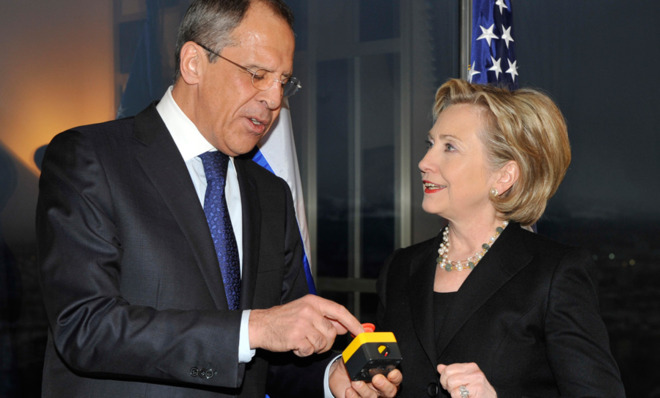Obama's 'reset' with Russia was actually a pretty good idea
The much-maligned initiative led to some major breakthroughs

A free daily email with the biggest news stories of the day – and the best features from TheWeek.com
You are now subscribed
Your newsletter sign-up was successful
It was an easy punch line from the moment the policy was announced in 2009. Five years later, with Russia now in control of the Crimean Peninsula once more, the idea of a "reset" with Moscow has become an even larger target for critics of the Obama administration. But in taking aim, many of those hurling metaphorical stones at the White House — asking the 21st-century version of the question "Who lost China?" — miss that the idea of the reset was a sound one. It was just one that had run its course.
When the Obama administration began touting the prospects of a policy "reset" with Russia, the response in many quarters was to dismiss the initiative as naive. It didn't help matters that Hillary Clinton, then secretary of state, delivered a giant red button to her Russian counterpart that was famously mislabeled to bear the Russian word for "overcharged" instead of "reset." And in the aftermath of Russia's military incursion into Crimea, if you were to print them all out, the sheer number of articles devoted to simply saying "I told you so" with regard to Vladimir Putin's intentions would provide a solid barrier between Russia and Ukraine.
But those articles and op-eds misunderstand the reset's intentions. It was never about forming a new and perfect relationship with Russia on par of that with our most trusted allies, as the reset's detractors say. Instead, it was about finding the areas in which the United States and Russia actually had a shared interest in bringing a policy to fruition. In 2009, such discrete avenues for partnership were being overlooked, former American ambassador to Russia Michael McFaul recently told a phone call full of reporters, and the reset was about actually identifying and executing them in a way that satisfied both the Kremlin and the White House.
The Week
Escape your echo chamber. Get the facts behind the news, plus analysis from multiple perspectives.

Sign up for The Week's Free Newsletters
From our morning news briefing to a weekly Good News Newsletter, get the best of The Week delivered directly to your inbox.
From our morning news briefing to a weekly Good News Newsletter, get the best of The Week delivered directly to your inbox.
The most visible — and contentious — early area of cooperation was nuclear disarmament. The fight in the U.S. Senate over the New START treaty — with its reductions in American and Russian nuclear arsenals to 1,550 nuclear warheads each and 700 deployed in nuclear-capable ICBMs, submarines, and bombers — nearly caused the reset to end before it really began. But despite outrage from American hawks that continues to this day, the treaty has managed to hold even as the Kremlin has threatened to withdraw from it during low points in relations.
On other fronts — including information sharing on terrorism, restoring communication channels suspended during the Bush administration, and keeping supply lines open for Western soldiers leaving Afghanistan — the change in attitude toward Russia seemed fruitful. And despite disagreement over whether Syrian President Bashar al-Assad should remain in power after three years of war, the U.S. and Russia both agreed last year that it was imperative Syria be stripped of its chemical weapons arsenal. Though the Ukraine crisis has disrupted the joint U.S.-Russian effort to dismantle the weapons, it has only slowed the process, not stopped it.
Most importantly of all, in the eyes of the White House, was getting Russia on board with regard to Iran. Even now, the members of the P5+1 — which includes the two former Cold War enemies along with France, Germany, China, and the United Kingdom — are negotiating as one to bring Iran's nuclear program more fully into the light of day. Given Russia's own interests in ensuring that Tehran doesn't possess a nuclear weapon, analysts predict, it has no reason to walk away from the other world powers' positioning.
The key to understanding how all these reset-sired efforts can survive the crisis in Crimea is that Russia is amazing at compartmentalizing — when it wants to be, anyway. For Russia, it can be easy to separate policies from each other in the interest of doing what Russia believes is best or only peripheral to its core interests, as when it joins the rest of the Permanent Five countries in the U.N. to vote to provide peacekeepers in African conflicts. But when it feels slighted or threatened, Moscow will not hesitate to link divergent issues together to score points, as seen in its decision to bar Americans from adopting Russian orphans in retaliation for sanctions against Russian human rights violators.
A free daily email with the biggest news stories of the day – and the best features from TheWeek.com
The successes that have been borne out of the reset are not small. But we've reached the point where the policy convergences between the U.S. and Russia are much rarer. On many issues, such as the matter of installing a missile shield in Eastern Europe or the expansion of NATO and the European Union, what Moscow sees as being in its best interests runs exactly opposite to Washington's goals for the world. And so we reach tipping points like Ukraine, where Russia ignores condemnation and proceeds to do whatever it wants, so long as it's within Moscow's power to achieve. That's not the fault of the reset policy. And a world where the White House never even tried would be a much more dangerous one indeed.